Onkyo TX-NR656 User Manual

> Before start > Hookup > Setup > Playback > Part Names
Basic Manual
Hookup |
|
Step1: Choose your Speaker Layout |
.......................................3 |
Step2: Connect the Speakers .................................................. |
9 |
Step3: Connect the TV .......................................................... |
11 |
Step4: Connect the AV Components ..................................... |
13 |
Step5: Connect Other Cables ................................................ |
17 |
Setup |
|
Step6: Power On & Initial Setup ............................................ |
18 |
HDMI Setup ........................................................................... |
19 |
Playback |
|
Basic Playback ...................................................................... |
20 |
Network Functions ................................................................. |
21 |
Others .................................................................................... |
23 |
Part Names |
|
Front Panel ............................................................................ |
25 |
Rear Panel ............................................................................ |
26 |
Remote Controller ................................................................. |
27 |
Display ................................................................................... |
27 |
AV RECEIVER
This manual includes information needed when starting up and also instructions for frequently used operations. The "Advanced Manual" is available on the internet with details about the playback features/ listening modes/settings details, specifications, and troubleshooting. The Advanced Manual is created in a format that makes it easy to read on a PC or Smartphone.
TX-NR656
http://www.onkyo.com/manual/txnr656/adv/en.html
Advanced Manual found here
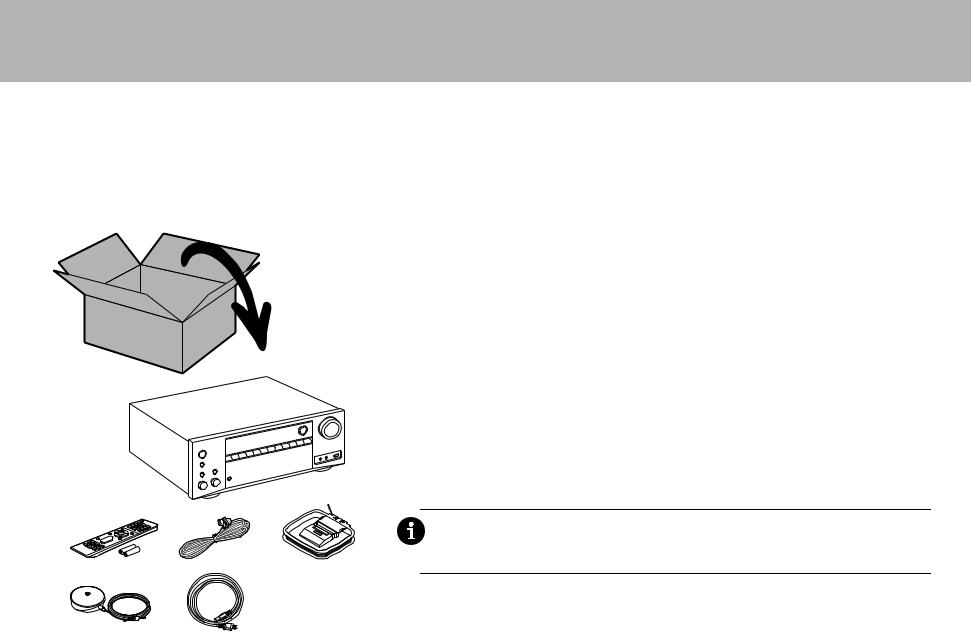
> Before start > Hookup > Setup > Playback > Part Names
1
2 |
3 |
4 |
5 |
|
6 |
|
|
(For Taiwanese |
|
|
models only) |
What's in the box
1. |
Main unit 2. Remote controller (RC-911R) ×1, Batteries (AAA/R03) ×2 |
3. |
Indoor FM antenna ×1 4. AM loop antenna ×1 5. Speaker setup microphone ×1 |
6. |
Power cord ×1 |
Main features
This unit is connected between your TV and your AV components. To play, select the source with the input selector. You can connect 7.1ch of speakers to this unit, with 7ch at 170 W (6 ohms, 1 kHz, 0.9%THD) (North American models) / 160 W (6 ohms, 1 kHz, 1%THD) (European, Australian, Asian and Taiwanese models) per channel plus a powered subwoofer pre out jack.
$ Supports playback in Dolby Atmos format which provides 360e sound placement
$ The HDMI jack supports 4K video input and output. Jacks IN1 to 3 and OUT MAIN/SUB support HDCP2.2
$HDMI CEC functionality: Control features such as linking input switching with the input selector and players conforming to the CEC standard, switching audio output and volume using the remote controller of a CECcompliant TV, and automatically switching this unit to standby when the TV is turned off
$ HDMI Standby Through: Video and audio signals from AV components can be transmitted to the TV even if this unit is in standby
$ ARC: Connection with an ARC-compatible TV is complete with one HDMI cable
$ Easy Initial Setup using onscreen guidance and On-Screen Display (OSD) showing operations on the TV
$Internet radio and Airplay via wired LAN or Wi-Fi (wireless LAN) and network features such as Music Server that enables PC music file playback, USB playback, plus other playback features such as AM/FM radio and
BLUETOOTH® play
$ Playback formats supported by Music Server and USB include WAV, FLAC and DSD high-res source
$ Multi-zone Connection which allows you to play in the main room and listen in a separate room (ZONE 2)
$We plan to provide support for the DTS:X audio format through a firmware update for this unit. Refer to our homepage for more information.
CAUTION: Connect speakers with 6 Ω to 16 Ω impedance. The power cord must be connected only after all other cable connections are completed.
0We will not accept responsibility for damage arising from the connection of equipment manufactured by other companies.
2
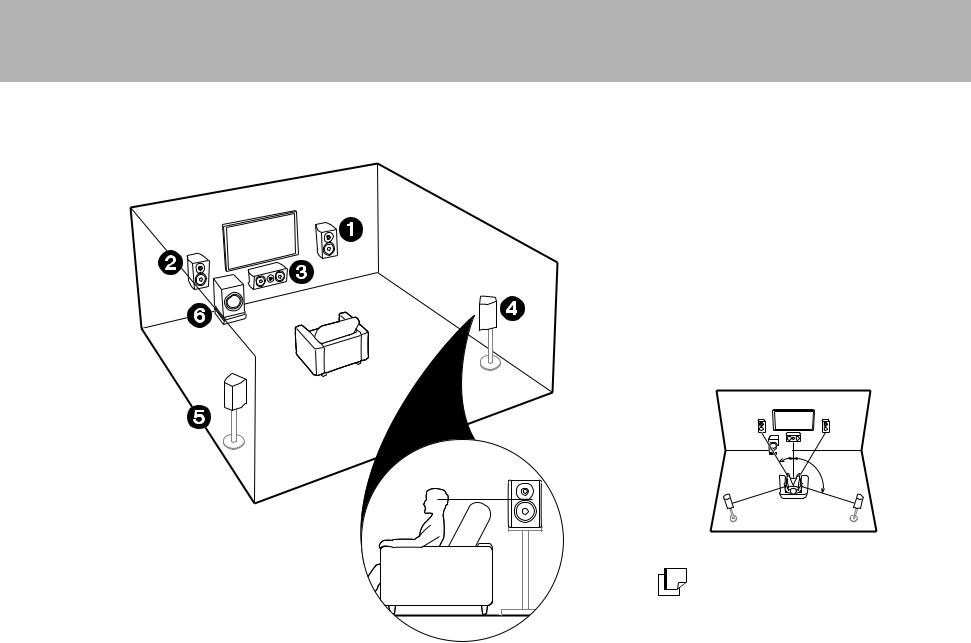
> Before start > Hookup > Setup > Playback > Part Names
Step1: Choose your Speaker Layout
12 Front Speakers
3 Center Speaker
45 Surround Speakers
6Powered Subwoofer
 For 5.1-Channel System
For 5.1-Channel System
This is a 5.1-channel system that is the basic surround system. Front speakers output front stereo sound and a center speaker outputs center sound such as dialogs and vocals. Surround speakers create back sound field.
Powered subwoofer reproduces bass sounds and creates rich sound field. The front speakers should be positioned at ear height, while the surround speakers should be positioned just above ear height. Center speaker should be set up facing the listening position. Place the powered subwoofer towards the front. Placing it between the center speaker and a front speaker gives you a natural sound even when playing music.
0The front speakers, center speaker, and surround speakers are counted as 5 channels, and the powered subwoofer is counted as 0.1 of a channel, giving us the name 5.1ch system.
1
2
1: 22e to 30e, 2: 120e
|
Go To "Hookup" (P9) |
|
3

> Before start > Hookup > Setup > Playback > Part Names
 For 7.1-Channel System (with
For 7.1-Channel System (with
Surround Back Speakers)
This is a system with surround back speakers added to the basic 5.1-channel system. The connection of surround back speakers improves the sense of envelopment and connectivity of sound created by the back sound field and provides a more real sound field. You can select the Dolby Atmos listening mode, which realizes the most up-to-date 3D surround sound, when the input format is Dolby Atmos. With formats other than Dolby Atmos, you can still create a sound field by outputting sound from the surround back speakers when you select the Dolby Surround listening mode. The optimal positioning is for surround back speakers to be at ear height. Place the surround speakers in a more slightly forward position than you would in a 5.1-channel system.
0If you are including surround back speakers in the setup, surround speakers are required.
1 6 (P3)
78 Surround Back Speakers
1
2
3
1: 22e to 30e, 2: 90e to 110e, 3: 135e to 150e
Go To "Hookup" (P9)
4
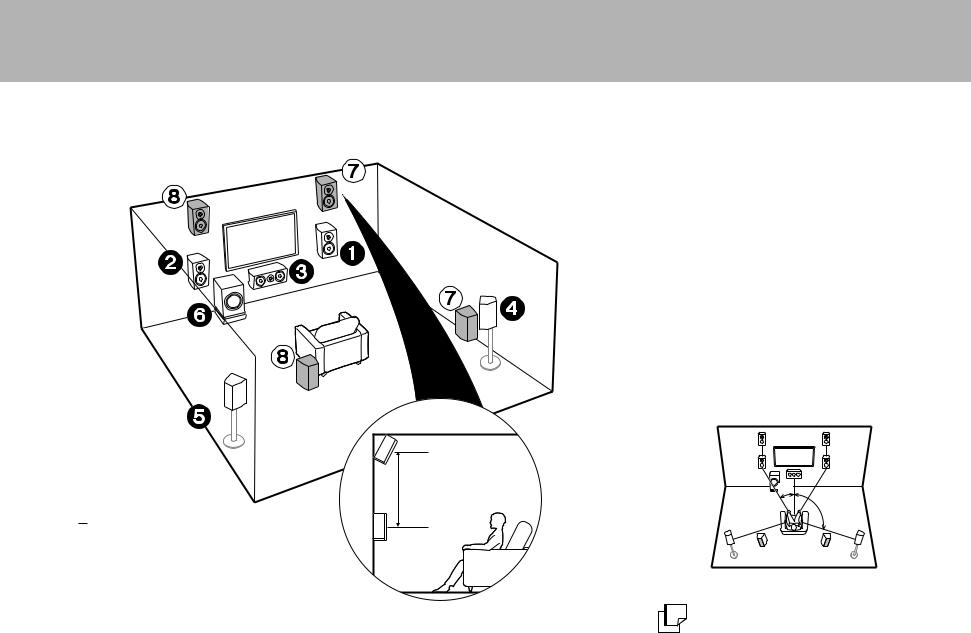
> Before start > Hookup > Setup > Playback > Part Names
3´ (0.9 m) or more
1 6 (P3)
78 Height Speakers
Choose one of the following:
$ Front High Speakers
$ Rear High Speakers
 For 7.1-Channel System
For 7.1-Channel System
(with Height Speakers-A)
This is a basic 5.1-channel system with the addition of height speakers, either as front high speakers or rear high speakers. Select which speakers to setup according to the environment of the room. You can select the Dolby Atmos listening mode (5.1.2 channel playback), which realizes the most up-to-date 3D surround sound including overhead sounds, when the input format is Dolby Atmos. With formats other than Dolby Atmos, you can still create a sound field by outputting sound from the height speakers when you select the Dolby Surround listening mode. Front high speakers or rear high speakers should be situated at least 0.9 m higher than the front speakers. Front high speakers should be situated directly above the front speakers and the distance between the rear high speakers should match the distance between the front speakers. Both should be set up facing the listening position.
1
2
1: 22e to 30e, 2: 120e
|
Go To "Hookup" (P9) |
|
5
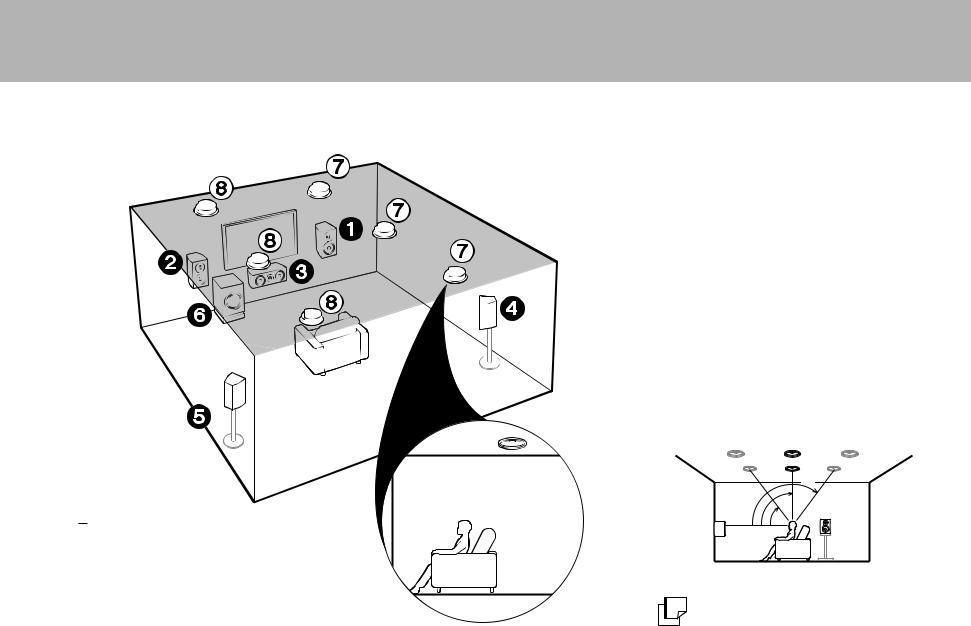
> Before start > Hookup > Setup > Playback > Part Names
1 6 (P3)
78 Height Speakers
Choose one of the following:
$ Top Front Speakers
$ Top Middle Speakers
$ Top Rear Speakers
 For 7.1-Channel System
For 7.1-Channel System
(with Height Speakers-B)
This is a basic 5.1-channel system using ceiling speakers, for example, with the addition of height speakers, either as top front speakers, top middle speakers, or top rear speakers. Select which speakers to setup according to the environment of the room. You can select the Dolby Atmos listening mode (5.1.2 channel playback), which realizes the most up-to-date 3D surround sound including overhead sounds, when the input format is Dolby Atmos. With formats other than Dolby Atmos, you can still create a sound field by outputting sound from the height speakers when you select the Dolby Surround listening mode. Fit top front speakers on the ceiling forward of the seating position, top middle speakers on the ceiling directly above the seating position, and top rear speakers on the ceiling behind the seating position. The distance between each pair should match the distance between the two front speakers.
0Dolby Laboratories recommends placing this type of height speakers to obtain the best Dolby Atmos effect.
3
2


 1
1
1: 30e to 55e, 2: 65e to 100e, 3: 125e to 150e
|
Go To "Hookup" (P9) |
|
6
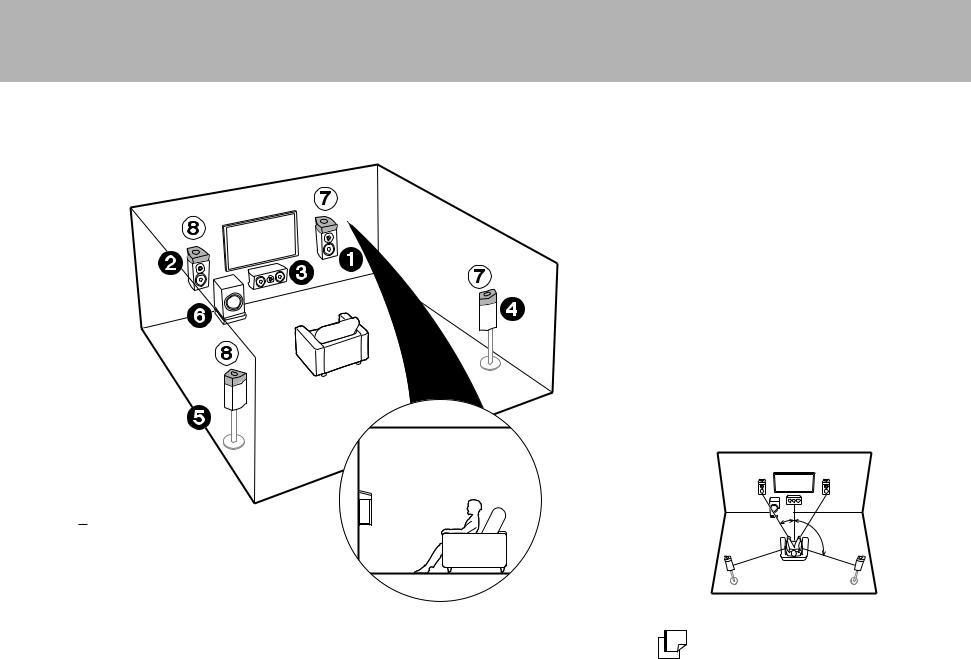
> Before start > Hookup > Setup > Playback > Part Names
1 6 (P3)
78 Height Speakers
Choose one of the following:
$ Dolby Enabled Speakers (Front)
$ Dolby Enabled Speakers (Surround)
 For 7.1-Channel System
For 7.1-Channel System
(with Height Speakers-C)
This is a basic 5.1-channel system using Dolby enabled speakers, with the addition of height speakers, either as Dolby enabled speakers (front) or Dolby enabled speakers (surround). Select which speakers to setup according to the environment of the room.
Dolby enabled speakers are special speakers designed to face the ceiling so that sound is heard after bouncing off the ceiling so that sound appears to be coming from overhead. You can select the Dolby Atmos listening mode (5.1.2 channel playback), which realizes the most up-to- date 3D surround sound including overhead sounds, when the input format is Dolby Atmos. With formats other than Dolby Atmos, you can still create a sound field by outputting sound from the height speakers when you select the Dolby Surround listening mode. Place them either above the front speakers or above the surround speakers. If they are integrated Dolby enabled speakers, put in place of the front speakers or the surround speakers.
1
2
1: 22e to 30e, 2: 120e
|
Go To "Hookup" (P9) |
|
7
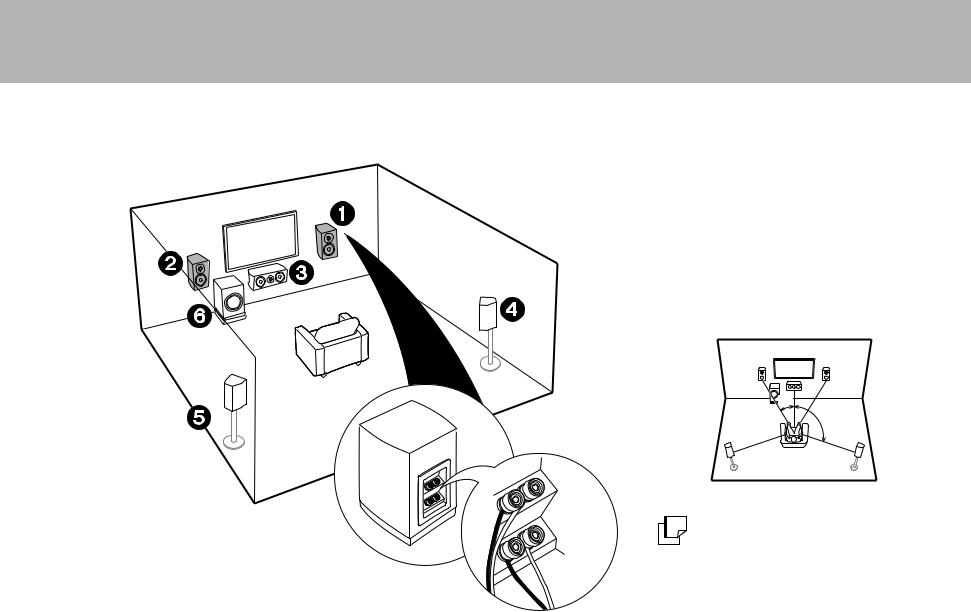
> Before start > Hookup > Setup > Playback > Part Names
12 Front Speakers (Bi-Amping)
3 Center Speaker
45 Surround Speakers
6Powered Subwoofer
 For Bi-Amping the
For Bi-Amping the
Speakers
It is possible to connect front speakers supporting biamping to improve quality of the bass and treble. The maximum number of channels available with this connection is 5.1 because Bi-Amping speakers require one amplifier for the tweeter jacks and one amplifier for the woofer jacks. The effects and placements for speakers are the same as the 5.1-channel plan that doesn't use Bi-Amping speakers.
0If you connect to speakers supporting Bi-Amping, speaker output in ZONE (P16) is not possible.
1
2
1: 22e to 30e, 2: 120e
|
Go To "Hookup" (P10) |
|
8

> Before start > Hookup > Setup > Playback > Part Names
Step2: Connect the Speakers
1/2˝ (12 mm)
1
 in case of:
in case of:
Pages 3 to 7
Connect 123456 for a 5.1-channel system. For a 7.1-channel system, select either surround back speakers or height speakers, and connect 78. Up to two powered subwoofers can be connected. The same signal is output from each of the SUBWOOFER jacks.
Setup
0 The speaker configuration is set to
12345678 audio output by default. If there are speakers you won't be connecting, you need to change the settings in Initial Setup, "1. AccuEQ Room Calibration" (P18) so that the audio from those speakers you are not connecting is sent to other speakers.
|
Make sure the exposed wires of the speakers do not stick out of |
|
|
the speaker terminals when connecting. If the exposed wires of |
|
2 |
the speakers touch the rear panel or the + and – wires touch each |
|
other, the protection circuit will be activated. |
||
|
1 Speaker cable, 2 Subwoofer cable
9
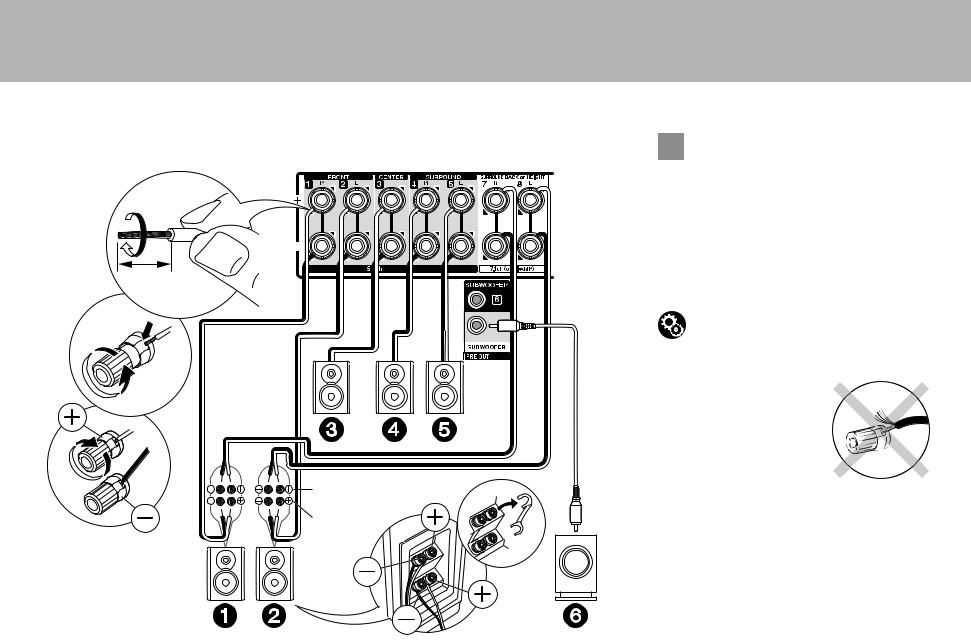
> Before start > Hookup > Setup > Playback > Part Names
1/2˝ (12 mm)
 in case of:
in case of:
Page 8
Connect front speakers compatible with Bi-Amping connection to the FRONT jacks and the SURROUND BACK or HEIGHT jacks. Make sure you remove the jumper bar fitted between the woofer jacks and tweeter jacks of the front speakers. In case of Bi-Amping connection, refer to the instruction manual of your speakers. Up to two powered subwoofers can be connected. The same signal is output from each of the SUBWOOFER jacks.
|
Setup |
|
0 Bi-Amping connection requires you to change |
1 |
some settings. Select "Yes" in "Bi-Amp" in "1. |
AccuEQ Room Calibration" (P18) in the Initial |
|
|
Setup. |
For high- |
2 |
|
frequency |
Make sure the exposed wires of the speakers do not stick out of |
|
For low- |
|
the speaker terminals when connecting. If the exposed wires of |
|
the speakers touch the rear panel or the + and – wires touch each |
|
frequency |
|
other, the protection circuit will be activated. |
1 Speaker cable, 2 Subwoofer cable
10
